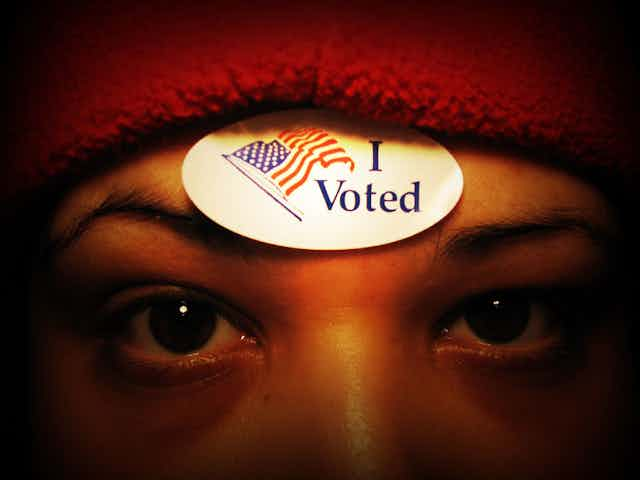When any American enters the voting booth, he (or she) is free to cast his private ballot for any candidate he favors. On the surface, this seems rather obvious, and easy. We each privately vote for the candidate we wish to support. We choose based on our preferences, so we vote correctly, right?
Well, maybe not. Over the past 10 presidential elections, an average of 26 percent of voters admit to voting incorrectly – that is, for a candidate who doesn’t actually match their political beliefs or expectations. In primaries, when candidates all share the same party affiliation, the percentage of incorrect votes is far higher. In primaries and elections, many people aren’t getting what they think they’re voting for.
Deeply concerned about inept government and the ugliness of the current presidential campaigns, former Senate leaders Republican Trent Lott and Democrat Tom Daschle have recently argued together that “democracy requires engagement, mindfulness and tolerance” and that the “only way to turn the spiral around is for the individual American to make a commitment to vote in the coming year.”
Voting is key, but it’s not simply the act of casting a ballot that matters: the critical question is which way people vote – and do they “vote right.”
Your vote should reflect your beliefs
The country needs people to cast votes consistent with what their preferences would be if they were fully informed – that is, as if they really knew what they would be getting. We call this “voting correctly.”

So why do a quarter of voters end up picking candidates that don’t match up with their own opinions? When people end up voting incorrectly, it’s typically because they’ve made assumptions based on little information and/or faulty impressions.
Naturally enough, most people pay less attention to collecting and digesting information about politics than they do to their families, friends and careers. Moreover, we often decide quickly on our preferred candidate, and then don’t change opinions – in fact, we dig our heels in deeper – even as new information and perspectives become available.
What then should a person do to vote correctly? You can start with some easy cognitive shortcuts – what researchers call political heuristics.
Figure out where candidates stand on issues
The most obvious (and useful) shortcut is to start with party affiliation: these days, Democrats and Republicans almost universally take pretty different policy stands. Then, especially for same-party primary candidates, look to the endorsements of familiar and trusted interest groups – let someone else figure out what the candidates’ actual policy proposals are.
Furthermore, if you’re worrying about the electability of your party’s candidate, don’t pay attention to the most recent poll. Even the best polls have a fair amount of uncertainty associated with their findings – typically in the neighborhood of +/- 4 points in the percentages they report. The media tend to jump on small changes, which often are due to nothing more than chance.
Instead, go to poll aggregators such as Real Clear Politics or 270 to Win to get more accurate readings on public opinion. Aggregators combine the results of a bunch of polls that asked pretty much the same question – whom are you going to vote for? – over the past month or so. That way the uncertainly associated with the findings shrinks rapidly.
If you want to put in a little more effort, go to the Internet sites of Project Vote Smart or OntheIssues.org. After you fill out a short questionnaire about your opinions on the issues, they will tell you which candidate’s opinions are closest to yours.
Meanwhile, do everything you can to ignore biased or unreliable information that happens to come your way. Sound bites, canned responses and jokes from late-night talk show hosts are not the best ways to form accurate, nuanced impressions of the candidates. (Candidates’ appearances on the talk show circuit can help voters get a better sense of their personalities and stances on issues, though.)

Think about their personal qualities
Of course you can add your personal judgments about what matters to you most in leadership. Leadership can be infinitely complex, but a helpful tactic is to assess potential elected officials on three broad criteria: competence, character and connection.
These cover a lot of important territory, including many more specific leadership skills – such as interpersonal, technical and problem-solving skills. The way these three factors translate into successful leadership is complicated – of course they all interact and have a number of qualifiers. But together they’re a starting point that can help organize our thoughts and bring a coherent framework to what otherwise can be frustratingly random discussions.
We should want sheer competence in our leaders. A key question, though, is competence at what? Beating the opposition? Navigating a particular party into the future? Unifying the country? Leading nationally, or on the global stage as well? What problems do you most want your leaders to solve?
Consider evidence for candidates’ relevant competencies. What experiences do the candidates have, and what have they really accomplished and failed at? Useful questions to mull over could include:
- How well might a career in the private sector (Trump) or medicine (Carson) prepare a person for the presidency?
- How does a long career in the public sector (Kasich, Sanders) help or hurt a candidate from seeing things in new and useful ways?
- Does a first-term senator (Cruz, Rubio) have enough experience in either sector?
- What do business bankruptcies (Trump), a mixed record of successes and mistakes in the global arena (Clinton) or a national debate championship (Cruz) say about a future president’s likely effectiveness?
There’s no “right” answer to these questions. It’s more a matter of using the available information to figure out which candidate will best represent what’s important to you.
Character is a second key factor. What do you know about candidates’ personal values? How ethical are their big-issue beliefs, from your perspective, and what methods (honesty, lies, insults, dirty tricks, negotiation, transparency, empty promises or promises plus a plan to pay for them) would they likely try in order to accomplish their goals? Again, facts and evidence are better than assumptions and the biased slants of many media sources.
Connection may be the most complicated factor we weigh when considering a leader. Some of our own research has identified particular behaviors that make people see a potential leader as embodying the charisma that we like in our leaders. These include having a compelling vision and communicating it clearly and often; being proactive and change-oriented; appealing to followers’ personal values; conveying optimism about future possibilities; and treating followers as human beings rather than cynically and manipulatively.
“Voting right” takes some work
In striving to vote correctly, the most useful connection question is not “how much do I like or relate to the candidates’ personalities?” Instead, the very best question may be “what is each candidate’s vision for the future, and how will they work with others to achieve it?”
Senators Lott and Daschle have said that candidates who do little more than demonize their opponents are simply “scratching the basest itches of the electorate.” When considering the guidelines offered here, voters, and maybe even candidates, can rise above their basest itches. Voting correctly – using valid outside information plus our own personal standards of competence, character and connection – is the key to promoting our best possible leaders.


